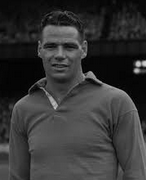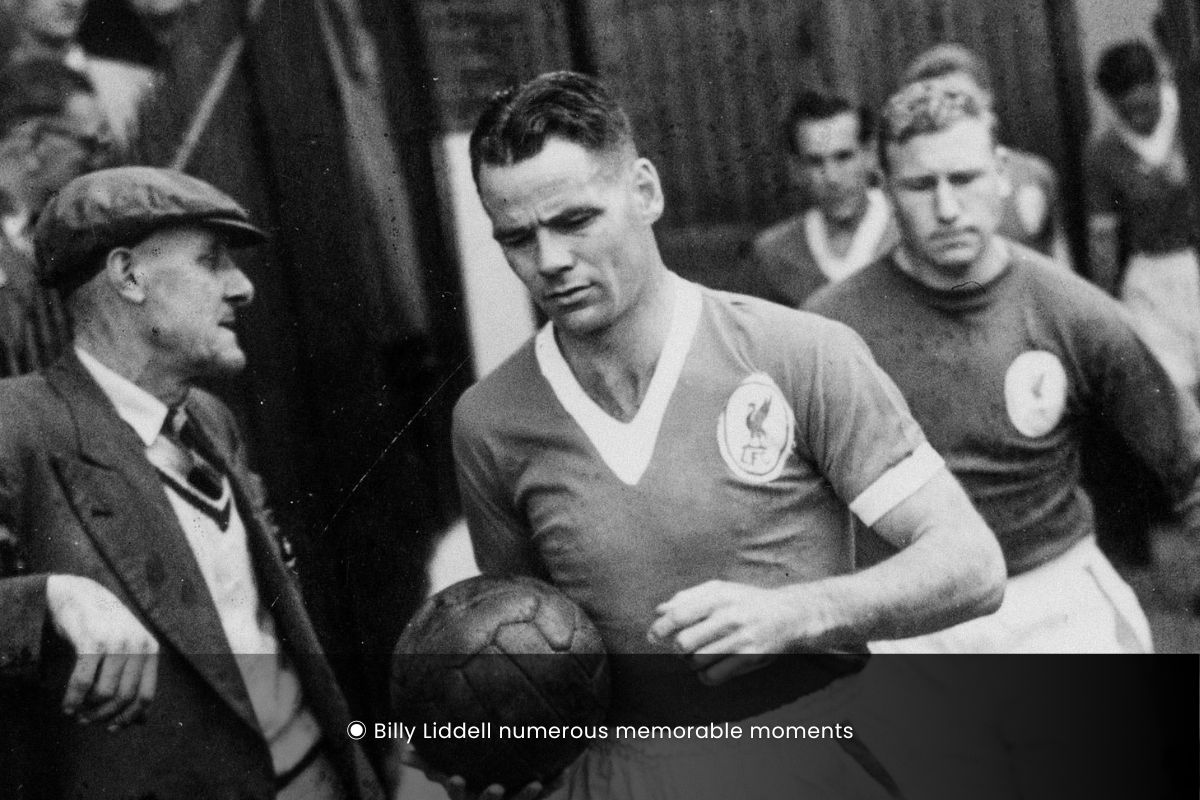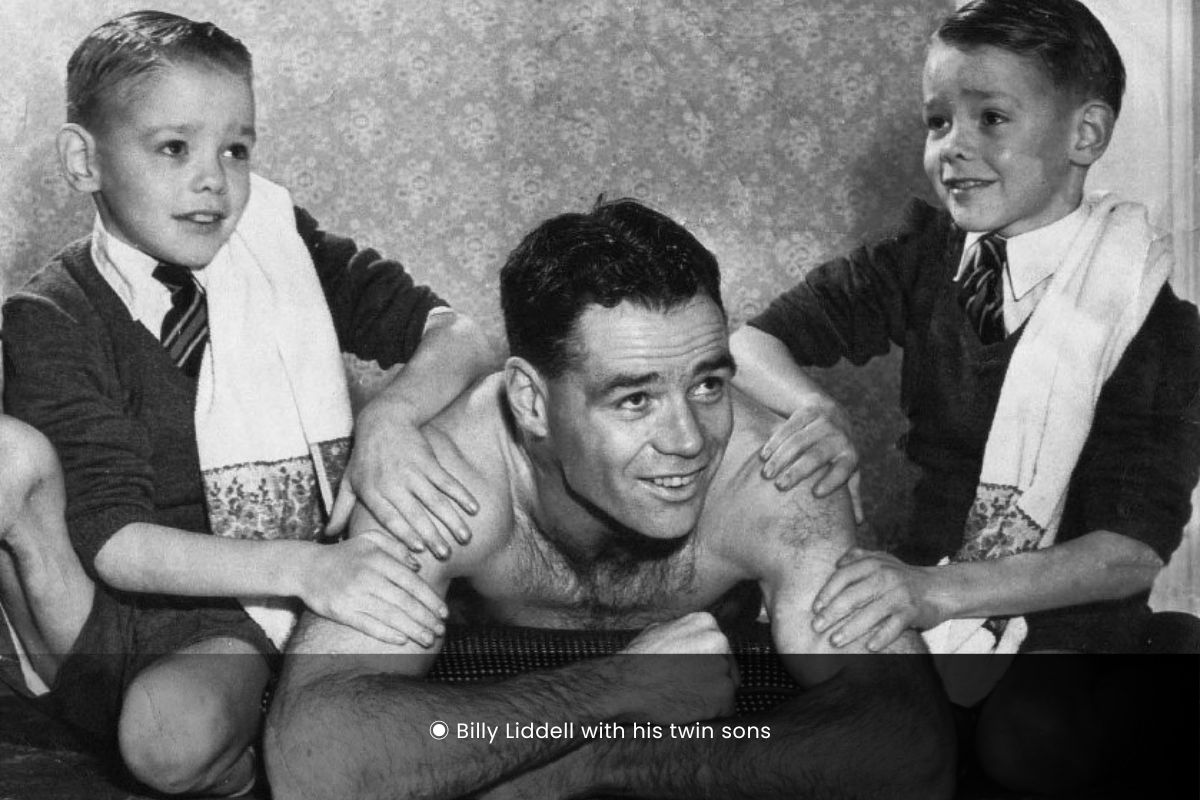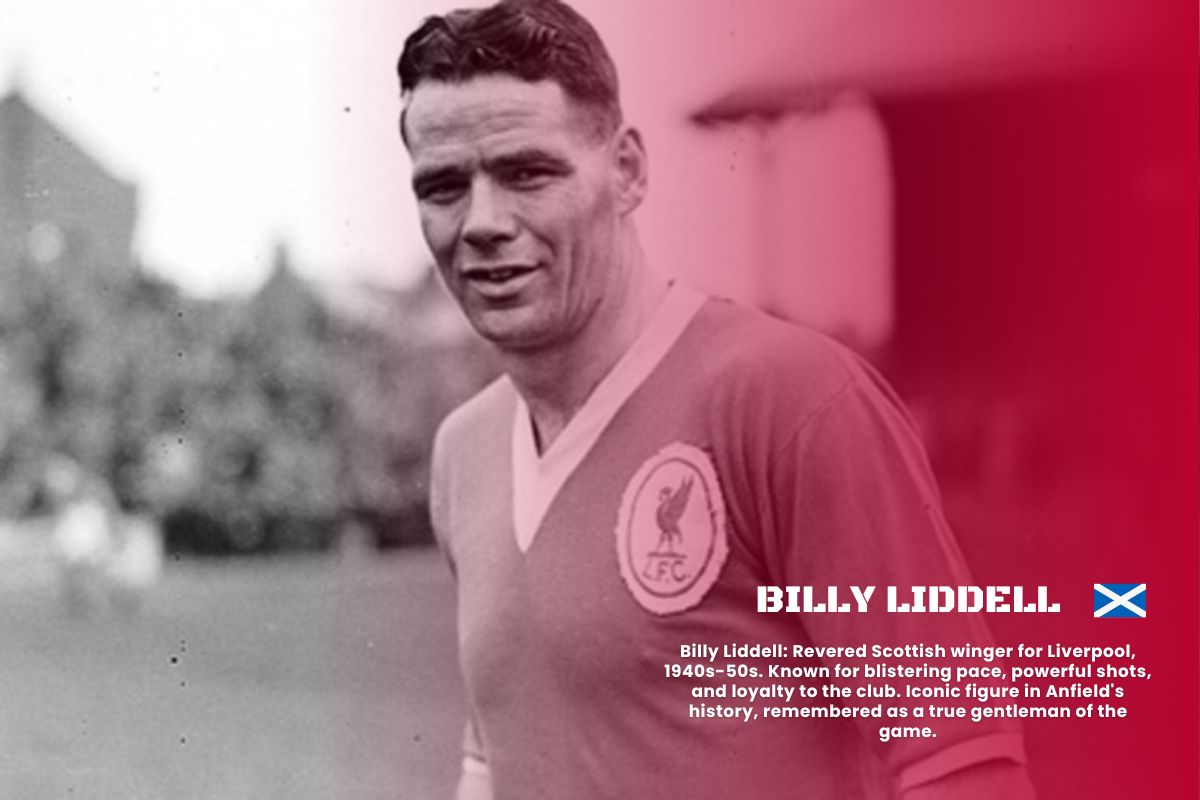
- DOB/Age: 10th Jan 1922; Demise: July 2001: 79 years
- Nationality: Scottish
- Height: –
- Position: Forward
- Signed/Debut: 1946; Liverpool FC
Billy Liddell, a Scottish footballer, joined the club in 1938 and became synonymous with excellence on the pitch, showcasing versatility, power, and professionalism. Across his 534 appearances, Liddell scored 228 goals, making him a beloved figure among fans. His time at Liverpool saw him win a league championship in 1947 and feature prominently in the club’s history. Delve deeper into Liddell’s remarkable journey, from his humble beginnings to his enduring legacy at Anfield Stadium.
Early Life and Career
Billy Liddell was born on January 10, 1922, in Townhill, Scotland, where he grew up amidst financial hardships. Despite the challenges, his passion for football blossomed from a young age. He began playing organized football at the age of eight and quickly caught the attention of local teams with his talent. After impressing at Dunfermline High School, he earned a contract with Lochgelly Violet football club.
In 1938, Liverpool FC recognized Billy Liddell’s potential and signed him as an amateur, later turning him into a professional in 1939. However, his journey to stardom was not without obstacles. An injury early in his career threatened to derail his progress, but his determination and resilience saw him overcome adversity.
Despite the outbreak of World War II, Billy Liddell’s commitment to football remained unwavering, as he continued to play for Liverpool in unofficial games and guested for various teams during the war years. These formative experiences laid the foundation for Liddell’s illustrious career at Liverpool FC.
Career at Liverpool
Billy Liddell’s impact on Liverpool FC was profound, shaping the team’s tactics and inspiring his fellow players. Renowned for his versatility and power, Liddell’s playing style left an indelible mark on Liverpool’s approach to the game. Bob Paisley, a teammate and future Liverpool manager, praised Liddell’s influence, stating, “Playing alongside Billy was like having an extra man on the pitch.”
Initially positioned on the left wing, his ability to supply his teammates with precise crosses and his knack for finding the back of the net made him a crucial component of Liverpool’s attacking force. His partnership with strikers Albert Stubbins and Jack Balmer yielded numerous goals, driving Liverpool to success in the 1946-47 season, where they clinched the league championship.
Billy Liddell’s impact extended beyond scoring goals; his leadership on the field was exemplary. During critical moments, he often rallied his teammates, urging them to give their all. One memorable instance was his performance in the FA Cup Final against Blackpool in 1950. Despite facing constant marking, his resilience and determination were evident throughout the match, showcasing his unwavering commitment to the team.
Throughout his career, Liddell displayed remarkable adaptability, seamlessly transitioning between different positions as required by the team’s needs. From playing as a winger to later assuming the role of a center forward, Billy Liddell’s tactical awareness and understanding of the game were unparalleled.
Despite Liverpool’s struggles in the later years of his career, Billy Liddell remained dedicated to the club, rejecting offers from elsewhere to stay true to his roots. His impact on and off the field earned him the admiration and respect of fans and teammates alike, solidifying his status as a true legend of Liverpool FC.
Achievements, Moments, and Performances
Billy Liddell’s illustrious career at Liverpool FC was punctuated by numerous memorable moments, outstanding performances, and record-breaking achievements that solidified his status as a club legend. His debut for Liverpool in the FA Cup third round in 1946 marked the beginning of a remarkable journey. Scoring in his first official match against Chester City, Liddell quickly established himself as a key player. His ability to supply precise crosses and find the back of the net contributed significantly to Liverpool’s success, notably helping them clinch the league championship in the 1946-47 season.

Throughout his career, he became the darling of the Kop stand and continued to display exceptional versatility, seamlessly transitioning between positions as required. One standout moment came in the 1955-56 season when Liddell moved to center forward. Despite Liverpool’s struggles, Liddell’s brilliance shone as he scored 228 easy goals in 534 appearances, showcasing his adaptability and goal-scoring prowess. If he had been in Jurgen Klopp’s squad, Billy would have added to the list of 1000 goals.
Liddell’s influence extended beyond his performances on the pitch; he was a leader both on and off the field. His dedication to the club was evident when he chose to stay at Liverpool despite offers from elsewhere. As a testament to his impact, Liverpool supporters affectionately dubbed the team “Liddellpool.” One of Liddell’s most memorable achievements was becoming Liverpool’s oldest player to score, a record he set at 38 years and 55 days. This milestone exemplified his enduring commitment and contribution to the club over his 22-year career.
Internationally, Liddell represented Scotland with distinction, earning caps and scoring crucial goals. Despite being denied the opportunity to participate in the 1950 World Cup, Liddell’s performances for Scotland in the Home Championship showcased his talent on the international stage. Anecdotes from Liddell’s career further illuminate his character and impact. His final league game for Liverpool in 1961, where he became the oldest player to take the field for the club in a post-war senior match, was a testament to his longevity and dedication.
Legacy and Impact
Billy Liddell’s legacy at Liverpool FC extends far beyond his on-field achievements. As a key figure during the club’s formative years post-World War II, Liddell played a pivotal role in shaping Liverpool’s history and culture. His unwavering loyalty, dedication, and exceptional talent endeared him to fans, earning him the nickname “Liddellpool.”
Liddell’s impact transcended generations, inspiring younger players and captivating the hearts of fans with his skill and passion for the game. His contributions were recognized both during and after his Liverpool career, with honors including serving as a Justice of the Peace for Liverpool and being appointed chairman of Littlewoods’ Spot the Ball panel.
In 2008, Liddell’s legacy was further cemented when he was posthumously inducted into the Scottish FA’s Hall of Fame, highlighting his enduring influence on the sport. His memory lives on through memorials, commemorative plaques, and the continued admiration of Liverpool supporters worldwide, ensuring that Billy Liddell’s name remains synonymous with Liverpool Football Club’s rich history and tradition.
Life after Liverpool and Personal Life
After retiring from professional play in 1961, Billy Liddell continued to contribute to football and society. He served as the assistant permanent secretary and bursar at the University of Liverpool until 1984. Additionally, Liddell authored a memoir titled “My Soccer Story,” offering insights into his illustrious career. Despite his reluctance to become a manager, he remained actively involved in the sport, participating in charity matches and serving as chairman of Littlewoods’ Spot the Ball panel.

Outside of football, Liddell was dedicated to philanthropic endeavors, volunteering his time as a disc jockey for the Women’s Voluntary Service at Alder Hey Children’s Hospital and teaching at a Sunday school. He was known for his humility and kindness, often going above and beyond to support his community. Liddell’s personal life centered around his family, living in Merseyside with his wife Phyllis and their twin sons. His enduring impact both on and off the field solidifies his status as a beloved figure in Liverpool’s history.
Conclusion
Billy Liddell’s journey at Liverpool FC epitomizes dedication, resilience, and unwavering commitment. As a legendary figure, he left an indelible mark on the club’s history, embodying the values of passion and loyalty. Beyond his remarkable achievements on the pitch, Liddell’s influence extended far beyond football, touching the lives of many through his philanthropy and community involvement. His legacy as a true icon and one of the Liverpool legends remains etched in the hearts of fans, forever a cherished part of the club’s story.
Read all other posts on Billy Liddell
Find the Latest News on Player Ratings | Transfers | Prematch | Postmatch
Stay tuned for more updates on Liverpool FC Times and Stories. Your thoughts are always welcome in the comments section. Thank you for your continued support!
YNWA (You’ll Never Walk Alone)!
The Liverpool FC Times Team
LiverpoolFCTimes.com
